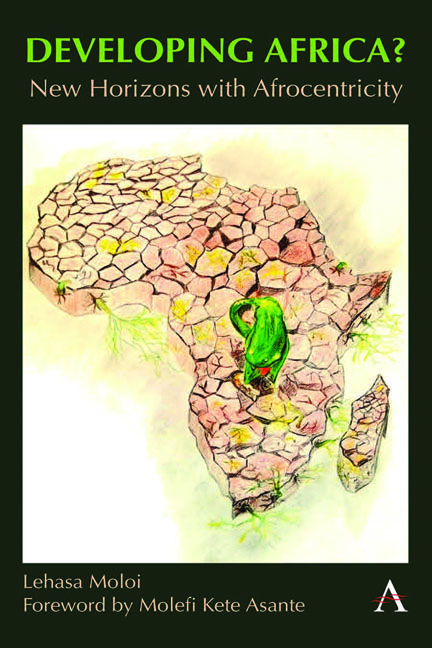Book contents
- Frontmatter
- Contents
- Foreword
- Preface
- Acknowledgements
- Relevance of the Dialogue
- Overview of the Book
- 1 Introduction
- 2 Theoretical Grounding: Afrocentricity’s Approach to Development
- 3 Critique of Eurocentrism and a Mapping of African Development Initiatives
- 4 Afrocentricity on the Significance of African History for Development
- 5 Afrocentricity on the Significance of Culture in the Conceptualization of an African Development Paradigm
- 6 Afrocentricity on the Significance of African Agency in Development in Africa
- Bibliography
- Index
1 - Introduction
Published online by Cambridge University Press: 13 April 2024
- Frontmatter
- Contents
- Foreword
- Preface
- Acknowledgements
- Relevance of the Dialogue
- Overview of the Book
- 1 Introduction
- 2 Theoretical Grounding: Afrocentricity’s Approach to Development
- 3 Critique of Eurocentrism and a Mapping of African Development Initiatives
- 4 Afrocentricity on the Significance of African History for Development
- 5 Afrocentricity on the Significance of Culture in the Conceptualization of an African Development Paradigm
- 6 Afrocentricity on the Significance of African Agency in Development in Africa
- Bibliography
- Index
Summary
As a young African writer from South Africa, I argue that the development project after World War II, rooted in the modernization paradigm, urgently needs to be reinterpreted in the context of, and against, the European Enlightenment project that traces its roots to the voyages of discovery from the late fourteenth century onwards. It has become abundantly clear that development ideas and practices grounded in this model will not bring about the development that Africa wants, but will continue to undermine African development initiatives and cement the Global North's domination agenda. I argue that African reconceptualization of its ideal development model should be grounded within the riches of African history and culture and needs to position Africans as their own agents, and not as objects. Only such a reconceptualization can liberate African development from parochial Eurocentric models.
We must shift the geography of reasoning and analysis away from a Eurocentric epistemology, towards African-centred epistemologies, in particular, using Afrocentricity as a revolutionary intellectual paradigm in our quest to liberate the discourse of development from the continuing bias towards the Eurocentric ideological framework. By doing so, we can work on a model that privileges African knowledge, informed by African history, culture and African agency, towards an African reawakening. I, therefore, deploy Afrocentricity as a relevant theoretical framework to relocate the interpretation of development to an African context to enable relevance to Africa. As Asante explains, Afrocentricity establishes an intellectual standpoint in which phenomena are viewed from the perspective of African people as centred within their own historical and cultural experiences. Such a perspective enables African people to take control of their own lives and be their own agents. This will allow them to become subjects rather than objects of others’ (under)development agenda. Afrocentricity as a paradigm enables a re-examination of all dimensions of the dislocation of African people resulting from the imposition of Western thought, be it regarding culture, economics, psychology, health or religious ideas around African societies, and development in general. This interrogation and reflection will enable Africans to assert themselves epistemically, thus dismantling their entrapment in the Western epistemic colonization of the terms of reference, and enabling African people to speak as their own agents of the change that they desire, rather than merely existing as ideological dependants of the European canon of thought.
- Type
- Chapter
- Information
- Developing Africa?New Horizons with Afrocentricity, pp. 1 - 14Publisher: Anthem PressPrint publication year: 2024



